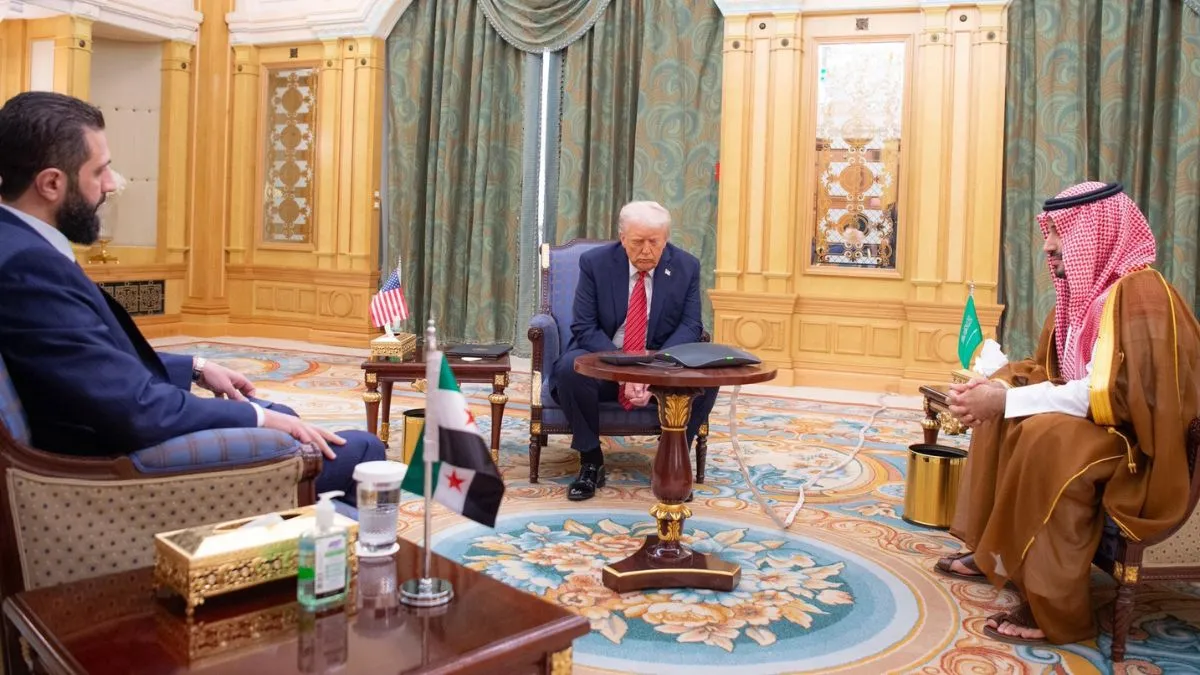- By Ajeet Kumar
- Wed, 14 May 2025 02:54 PM (IST)
- Source:JND
US President Donald Trump met with his Syrian counterpart, Ahmed al-Sharaa, in Saudi Arabia on Wednesday, hours after saying he would order the lifting of sanctions on Syria at the behest of Saudi Arabia's crown prince, a major US policy shift.
This was Trump's first encounter between the president and the former al-Qaeda commander who took power after Bashar al-Assad was toppled. During the meeting, Trump urged Sharaa to sign onto the Abraham Accords with Israel, news agency Reuters reported, citing a White House spokesperson. The Abraham Accords are bilateral agreements on Arab–Israeli normalisation signed between Israel and the United Arab Emirates and between Israel and Bahrain on September 15, 2020.
HRH the Crown Prince, #US President, and #Syrian President in Riyadh.
— Foreign Ministry 🇸🇦 (@KSAmofaEN) May 14, 2025
pic.twitter.com/Ju8jfnXraW
#Riyadh | A meeting brings together HRH the Crown Prince, the U.S. President, and the Syrian President in Riyadh, with the Turkish President participating via phone. pic.twitter.com/eE3ZhvnamI
— Foreign Ministry 🇸🇦 (@KSAmofaEN) May 14, 2025
"I will be ordering the cessation of sanctions against Syria in order to give them a chance at greatness," Trump told an investment forum in Riyadh, at the start of a tour of Gulf Arab states. "It's their time to shine. We're taking them all off," Trump said, "Good luck, Syria, show us something very special." Trump said he made the decision after discussions with Saudi Crown Prince Mohammed bin Salman and Turkish President Tayyip Erdogan, whose governments have both strongly urged the lifting of sanctions.
Key points Trump made to Syrian President
1. Sign onto the Abraham Accords with Israel
2. Tell all foreign terrorists to leave Syria
3. Deport "Palestinian terrorists"
4. Help the United States to prevent the resurgence of ISIS
5. Assume responsibility for ISIS detention centers in Northeast Syria
Trump's surprising move to remove Syria from sanctioned list
Removing US sanctions that cut Syria off from the global the financial system will clear the way for greater engagement by humanitarian organisations working in Syria, easing foreign investment and trade as the country rebuilds. The surprise move came despite deep Israeli suspicion of Sharaa's administration, worries initially shared by some US officials. Israeli officials have continued to describe Sharaa as a jihadist, though he severed ties with al Qaeda in 2016.
Trump said he would remove all sanctions, saying they had served an important function, but it was time for Syria to move forward. He said steps were being taken to restore normal relations with Syria, and US Secretary of State Marco Rubio would meet his Syrian counterpart this week.
Syria calls Trump's move a "turning point"
Syrian Foreign Minister Asaad al-Shibani, in a statement to news agency Reuters, said it marked a turning point for the Syrian people in their efforts to rebuild. "We ... stand ready to foster a relationship with the United States that is rooted in mutual respect, trust and shared interests," Shibani said. He also said Trump could get a "historic peace deal and victory for US interests in Syria," without elaborating. Joseph Aoun, president of neighbouring Lebanon, hailed Trump's "bold move" as another step on Syria's path towards recovery and stability.
Alex Zerden, a senior fellow at the Centre for a New American Security said Trump's announcement would unwind a "Gordian knot" of sanctions, export controls and terrorist designations that had made Syria one of the most economically restricted countries, along with Iran, North Korea and Cuba. Under Assad, Syria remained in a state of war with neighbouring Israel, had close ties to Iran and Russia and had turbulent relations with the West. Since December, Israel's military has occupied Syrian territory near the Golan Heights, which Israel has occupied since 1967, while also carrying out regular airstrikes in the country.
Syrian officials have meanwhile signalled their openness to a detente and even eventual peace with Israel. The decision is a major boost for Sharaa, who has been struggling to bring the country under the control of the Damascus government. The challenges were laid bare in March when Assad loyalists attacked government forces, prompting revenge attacks in which Islamist gunmen killed hundreds of civilians from the Alawite minority, drawing strong US condemnation.
Sharaa was for years the leader of al Qaeda's official wing in the Syrian conflict. He first joined al-Qaeda in Iraq, where he spent five years in a US prison. The United States removed a $10 million bounty on Sharaa's head in December. Most sanctions laws passed by Congress, including a 2019 package of stiff sanctions on Syria, include a provision allowing a president to suspend them if he deems it to be in the US national security interest. Members of both US political parties welcomed the announcement.
Why is it a big deal for Syria?
The United Nations, which has been pushing countries to lift sanctions on Syria, also welcomed the move. "It was important for us to see relief on sanctions on Syria to help the reconstruction of Syria, to help the Syrian people recover from more than a decade of conflict, a decade of under investment," said UN spokesperson Stephane Dujarric.
Formerly known as Nusra Front, the Islamist Hayat Tahrir al-Sham was al Qaeda's official wing in Syria until breaking ties in 2016. HTS was officially dissolved in January. The group has been on the UN Security Council al Qaeda and Islamic State sanctions list for more than a decade, subjected to a global assets freeze and arms embargo. There are no UN sanctions on Syria over the civil war.
(With inputs from agency)

